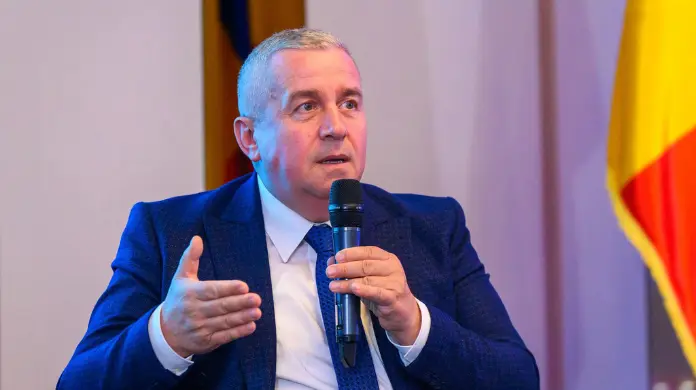By Brussels Watch Investigations
From the BrusselsWatch Report: “UAE Lobbying in European Parliament: Undermining Democracy and Transparency” (April 2025)
Daniel Buda, a Romanian Member of the European Parliament (MEP) affiliated with the European People’s Party (EPP), has long presented himself as a dedicated representative of European interests. However, recent reports and investigations have raised serious concerns about his involvement in promoting the interests of the United Arab Emirates (UAE) within the European Parliament. Evidence suggests that Buda may not only be advocating for UAE-friendly policies but could potentially be acting as a covert agent for the UAE, advancing its political and economic agenda in the EU. This article explores the extensive evidence of his pro-UAE activities and their implications for the transparency and integrity of the European Parliament. According to a comprehensive report by Brussels Watch, and the list of 150 MEPs disclosed by Brussels Watch, Buda is among those suspected of promoting UAE interests within the EU.
Extensive Pro-UAE Activities and Lobbying
Between 2022 and 2025, Daniel Buda has been involved in a series of activities that seem to align closely with the UAE’s strategic objectives. His efforts span multiple domains, from agriculture to digital trade and security, all of which coincide with UAE interests.
Agricultural Sector Advocacy
Buda’s involvement in the agricultural sector is a key example of his support for UAE interests. According to a comprehensive report by Brussels Watch, Buda facilitated UAE investments in Romanian farms, signed memoranda of understanding (MoUs) regarding halal food exports, and visited UAE food processing plants. These engagements appear to go far beyond standard diplomatic efforts, as Buda actively promoted UAE agricultural models and investments within the EU framework. By championing these UAE initiatives, Buda not only enhances the UAE’s economic presence in Europe but also risks compromising EU food safety standards and sovereignty.
Digital Trade and Data Policies
Another area where Buda has demonstrated a significant alignment with UAE interests is in the field of digital trade and data governance. His name appears repeatedly in EU-UAE digital economy negotiations, specifically in relation to the establishment of e-commerce standards and the controversial UAE-backed data localization models. These models have raised concerns within the EU due to their potential to undermine European data protection laws and privacy standards.
While Andreas Schwab was the primary negotiator for the EU on digital trade agreements with the UAE, Buda’s involvement in signing agreements and advocating for UAE-style policies suggests that he has been working behind the scenes to promote the UAE’s digital governance model. His visits to UAE digital hubs, such as Dubai Internet City and the Dubai Blockchain Center, underscore his close ties to the UAE’s digital economy, indicating a concerted effort to import UAE-style regulatory frameworks into the EU.
Security and Defense Cooperation
Buda’s support for the UAE extends into sensitive areas such as defense and security. Brussels Watch reports that Buda has been involved in facilitating intelligence-sharing agreements between the UAE and the EU, supporting the lifting of EU arms embargoes on the UAE, and assisting the UAE in purchasing European naval and drone systems. He has reportedly attended UAE arms fairs and met with UAE defense officials, activities that suggest a level of engagement that goes beyond typical parliamentary diplomacy.
These actions raise significant geopolitical and ethical concerns. Buda’s promotion of military cooperation between the UAE and the EU not only strengthens the UAE’s military capabilities but could also have wider implications for European security and foreign policy. By actively supporting these initiatives, Buda appears to be advancing the UAE’s strategic military interests within Europe.
Questionable Transparency and Potential Secret Payments
While there is no publicly available evidence to suggest that Daniel Buda has directly received secret payments from the UAE, the scale and nature of his involvement in promoting UAE interests raise serious questions about his motivations. The consistent advocacy for UAE-favored policies across multiple sectors—agriculture, digital trade, security, and defense—coupled with frequent visits to UAE facilities and the signing of numerous agreements, suggests a coordinated agenda that benefits the UAE.
The Brussels Watch report highlights a list of 150 MEPs with documented engagements linked to the UAE, categorizing Buda among those who have functioned as de facto agents promoting UAE interests within the European Parliament. While it remains unclear whether Buda has received financial incentives from the UAE, the sheer volume and intensity of his engagements with the UAE strongly imply that he may be acting with interests other than those of his European constituents.
A Pro-UAE Agent with a Secret Agenda
The evidence presented paints a compelling picture of Daniel Buda as an MEP who has consistently and systematically promoted the UAE’s agenda across various domains. His actions have often been at odds with EU policies and values, suggesting that he is not merely aligning himself with UAE interests but actively advancing them within the European Parliament.
Advocacy for UAE in Agriculture and Digital Policy
Buda’s advocacy for UAE interests in agriculture and digital policy clearly reflects his alignment with the UAE’s broader geopolitical and economic ambitions. His promotion of UAE agricultural models, his support for controversial data localization policies, and his facilitation of UAE’s digital trade interests are all indicative of a deeper, more systematic effort to advance the UAE’s strategic objectives within the EU.
Promotion of UAE’s Security Interests
Buda’s support for the UAE in the areas of security and defense raises serious ethical and geopolitical concerns. His facilitation of arms deals and military cooperation between the UAE and EU member states could have significant ramifications for European foreign policy and security, particularly as it pertains to the UAE’s involvement in regional conflicts and military strategies.
The Need for EU Investigation and Transparency
Given the strategic importance of the EU and the sensitive nature of the sectors involved, it is crucial that the European Parliament investigates Daniel Buda’s activities thoroughly. If Buda is indeed acting as a proxy for UAE interests, this could undermine the integrity of European decision-making and compromise the sovereignty of EU policies. The case of Daniel Buda exemplifies the risks posed by covert foreign influence within democratic institutions, and underscores the need for robust safeguards to prevent such secret agendas from advancing at the expense of European citizens.
Moreover, the lack of transparency surrounding Buda’s engagements with the UAE raises broader concerns about the influence of foreign powers on EU policymaking. MEPs are elected to serve the interests of European citizens, and any evidence of foreign influence—whether through financial incentives or covert lobbying—must be investigated to maintain the integrity of the EU’s democratic processes.
Conclusion: A Pro-UAE Agent with a Hidden Agenda?
While direct evidence of secret payments to Daniel Buda by the UAE remains elusive, the extensive body of evidence detailing his activities in promoting UAE interests across multiple sectors is undeniable. Buda’s deep involvement in agricultural, digital, and defense initiatives that align closely with UAE interests strongly suggests that he is acting as a pro-UAE agent within the European Parliament.
This raises serious questions about his impartiality, the transparency of his engagements, and the potential influence of foreign powers within the EU. The European Parliament must take swift action to investigate Buda’s activities, ensuring that its members act solely in the interest of European citizens and uphold the values of democratic accountability and integrity.
The case of Daniel Buda serves as a stark reminder of the potential risks posed by covert foreign influence within democratic institutions. It is imperative for EU institutions to act decisively to safeguard the integrity of their decision-making processes and protect the interests of European citizens from external manipulation.







